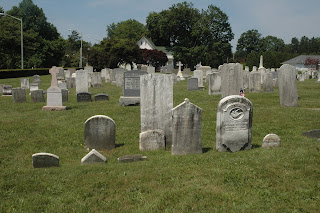The Saint Paul's Evangelical Lutheran Church website is located here: http://www.stpaulsardmore.org/cemetery.html
The cemetery website is located here:
http://www.lowermerionhistory.org/burial/lutheran/Peter Wallover is listed here, along with other relatives I am sorting out:
http://www.lowermerionhistory.org/burial/lutheran/w.html
| Wallover | Ann Maria | January 31, 1818 | Plot C1033 grave 2 South portion |
| Wallover | Margaretta | September 15, 1846 | Plot C1033 grave 4 North portion |
| Wallover | Peter | April 17, 1824 | Plot C1033 grave 3 North portion |
| Wallover | Peter W. | January 26, 1905 | Plot C1033 grave 3 North portion |
| Wallover | December 5, 1871 | Plot 64 grave 1 South portion |
| Shafer | Charles G. | August 24, 1878 | Plot 64 grave 2 South portion |
| Shafer | Clarence A.S. | March 30, 1886 | Plot 64 grave 5 North portion |
| Shafer | George L. | March 20, 1898 | Plot 64 grave 3 North portion |
| Shafer | Lizzie H. | August 5, 1881 | Plot 64 grave 4 |
| Shafer | Melisa S.E. | February 23, 1905 | Plot 64 grave 5 North portion |
| Shafer | Sarah Ann | Unknown | Plot 64 grave 1 South portion |
| Shafer | Willie | Unknown | Plot 64 grave 6 North portion |
| Kartchner | John Christopher | Unknown | Plot 64 grave 2 South portion |
| Leader | Linnie | Unknown | Plot 64 grave 4 North portion |
1) First, Peter W. Wallover's grave is located next to the others in Plot 64.
2) His death date reads December 25, 1871.
3) So, who is the other person whose death date is January 26, 1905? I'm looking into that.
Here are the other graves:
This headstone was broken in two pieces. :(
I think it says:
In Memory Of
Lizzei H.
Daughter
? Shafer
Linie C. Leader
Anyone else wonder why the misspellings?











